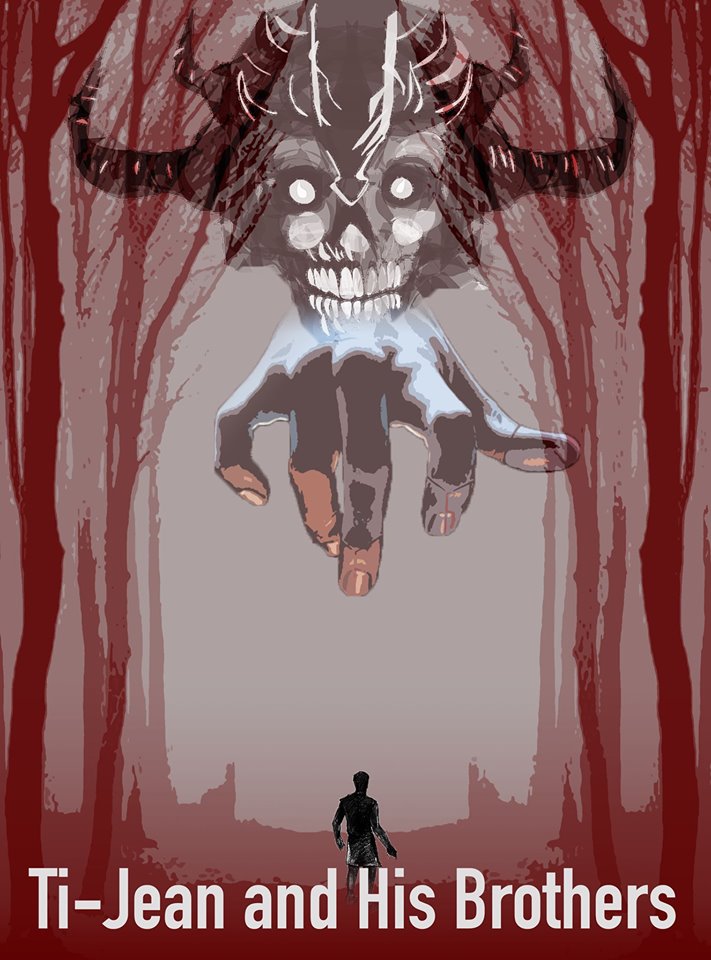Tuesday Night Café’s (TNC) performance of Ti-Jean and His Brothers, a modern Caribbean folktale written by Derek Walcott and premiered at Morrice Hall on Oct. 16, is enticingly bizarre. The production is the first of the year from the entirely student-run theatre company and features plenty of up-and-coming actors from the McGill community, including actor and director Deneille Guiseppi.
The play itself is a surreal combination of traditional folk themes set in a more modern colonial context. Ti-Jean and His Brothers takes places some time in the early- to mid-20th century and revolves around the eponymous characters Ti-Jean (Laura Quenneville), Gros-Jean (Deneille Giuseppi), and Mi-Jean (Ryan Chahri) as they clash with the Devil when he shows up on their doorstep. The Devil wishes to live as a human to experience all the horrible things that he has done to the world. He disguises himself as various characters, such as a white plantation owner and an old man, and torments Ti-Jean and his brothers in sadistic ways from behind a human disguise.
The overall atmosphere of the play is accentuated by simple, yet effective set design. The set consists of an arch of branches covered in leaves and some contemporary props, like a lantern and some wooden lawn chairs. They create a fantasy-like setting while clearly being a thematic device representing colonial thinking.
Camille Simon stands out as the boys’ mother, heartbroken as each of her sons leave her in pursuit of a fight against an insurmountable adversary. Her markedly sympathetic disposition brightens this dark play full of tragically flawed characters, and Simon presents this dynamic faithfully.
Jacob Berk gives a commanding performance as the Devil, channeling his inner-demon to perform the role in the most maniacal, conniving and evil way possible. When he gets angry, the sentiment is palpable.
Samantha Ling and Rebecca Turner introduce and lead us through the play as narrators. Taking the form of a frog and a firefly, respectively, Ling and Turner add a much needed touch of levity to a relatively serious production, adding to the play’s twisted fairytale-esque production.
Chahri and Quenneville give dedicated performances as the younger two children, Mi-Jean and Ti-Jean. Mi-Jean is intellectual to a fault, lacking in common sense. Ti-Jean, the smallest of his brethren, is the only one clever enough to have a chance at overcoming his great evil through his faith in God. Despite decent performances, the fact that their characters are written as black boys, despite both actors being white inherently challenges the audience. While this casting choice seldom gets in the way of a general understanding of the narrative, it does muddle the colonial undertones. It is unfortunate that these roles were taken up by white actors, when they could have offered valuable representation for Afro-Caribbean performers at McGill.
Guiseppi plays double duty as Gros-Jean and as the play’s director. Her character is the brawny and hot-headed brother, the first of the devil’s victims. Her direction has a clear vision, and though it is a respectable and ambitious one, the play falls short of achieving such heights. Guiseppi attempts to translate an obscure Caribbean folktale to a McGill stage while retaining all of its original integrity and historical value, and despite some talent in the cast, many were not playing roles they appeared entirely comfortable in. Still, her Caribbean roots shine through, and make Ti-Jean and His Brothers a valuable viewing experience.








